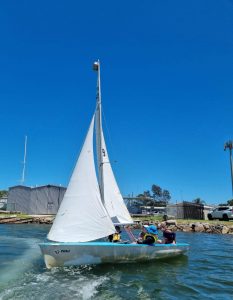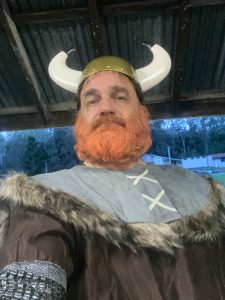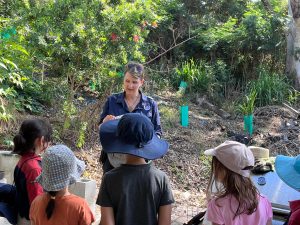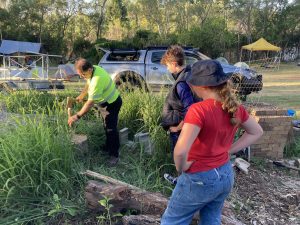
Lead the Adventure!
What does it mean to volunteer?
It’s the act of charitable giving through unpaid time. Within our Sea Scout Group, volunteers serve as the cornerstone of our organisation, driving forward our Scouting Mission dedicated to the educational advancement of young individuals. While the manner in which individuals contribute through volunteering may vary, we are united by a shared objective rooted in our Aim and Mission.

Why volunteer for Scouts?
Scouting is one of the largest volunteer-based movements in the world, with 40+ million members, including over 5 million adult volunteers! Scouting gives you so many opportunities to grow personally, professionally and socially.
Here are 10 ways that volunteering with Scouts will give back to you:
- You become an active citizen.
You are needed! Volunteering gives you a chance to empower young people and to create the kind of community and world you want to live in. - You become innovative.
Depending on the role you take on, you can build skills in leadership, communication, planning, self-management and more. All of this adds up and helps to improve skills for life – from teamwork and self-management to problem-solving and people skills. - You become part of a huge family.
Volunteering gives you access to the Scout family, which means you instantly gain more than 40+ million brothers and sisters around the world! You’ll meet people with similar interests and make life-long friends you’ll love taking on adventures with. - You become more confident.
Volunteering is a fun challenge! Helping others to achieve their goals and succeed can lead to greater self-esteem and encourage you to face and overcome other challenges. - Your time is appreciated.
Do you have time to give once a week? Once a month? Once a year? Volunteering with Scouts is based on a flexible model as agreed upon with your group. Any time you can commit is appreciated! - You become experienced.
Volunteering improves your employability by equipping you with skills & knowledge that employers love! Besides those named already, it helps show your commitment, passion and creativity. It shows that you have an interest in improving your community and yourself. Plus, you’ll get to take part in some great training programmes. - You become healthier.
Yes, it’s true! Studies show that when you focus on someone other than yourself, stress levels start to decrease, the immune system is strengthened and sense of satisfaction increases. Bring on the sense of purpose and positive emotions! (Those hiking and camping trips can’t hurt, either!) - You become a changemaker.
In 2015, the United Nations announced the 2030 Agenda for Sustainable Development, with 17 Sustainable Development Goals (SDGs) at its heart. Scouts are committed to forming the world’s largest coordinated youth contribution to the SDGs by 2030. And you can be a part of #Scouts4SDGs! - You become inspired.
Meeting new people, changing your routine or taking a break to think about others can change how you see the world and spark new interests. You might come up with ideas to improve yourself, or even discover a new life calling! This shift in perspective opens your mind, and helps to build bridges of purpose and new commitments in life. - You have fun!
While volunteering needs to be treated with the utmost respect, it’s also REALLY fun! You meet new people, embrace diversity and discover new adventures. By helping children and young people to unleash their full potential, you also open the door for YOUR POTENTIAL to bloom!

Join to Lead the Adventure with us!
Joining our ranks as a volunteer with Scouts isn’t just about what you can give—it’s about what you gain, too. By becoming part of our dynamic community, you’re opening doors to personal and professional development opportunities that are as diverse as our global membership. Whether you’re seeking to enhance your leadership abilities, expand your network of like-minded individuals, or simply have fun while making a difference, Scouts offers a supportive environment where your skills and passions can flourish. Moreover, as a Scout volunteer, you’ll have the chance to contribute to something larger than yourself, joining a Movement that’s committed to empowering young people and creating positive change in the world. So, why wait? Take the next step towards a more fulfilling and impactful future by joining us at Scouts today. Together, let’s embark on an adventure filled with growth, camaraderie, and endless possibilities.

What can I do?
In the vibrant world of Scouting, the question “What Can I Do?” unveils a wealth of opportunities for personal development and community engagement. As a Scout volunteer, you have the chance to explore diverse roles tailored to your skills and interests:
-
Youth Program Leader: Guide and inspire young Scouts, leading outdoor adventures, facilitating skill-building workshops, and fostering leadership development.
-
Program Support Leader: Provide essential support and resources to Scout programs, assisting with logistics, organization, and ensuring smooth operation of activities and events.
-
Group Support Committee Member: Contribute strategic direction and governance to the Scout group, participating in decision-making, fundraising efforts, and overall support to ensure the Group’s success.
Each position offers a unique avenue to make a meaningful impact within our Scout community. Join us today, and together, let’s unleash the potential within and have fun doing it.
Recruitment Process
Initial Application
The recruitment process for adults are similar to the youth sign up process. The kye difference is that adults, as part of Scouting’s resonsibilities to maintain a child-safe environment, undergo reference checks by an external service. You need 2 referees to which only one may be from a Scouting background. Upon the completion membership application and reference checks, the Group Leader must endorse your application to be a member.
- Talk to one of our Leaders or Committee members about what might be suitable for you
- Apply via the online member application on the Scouts Queensland website
- Undergo reference checks (2 referees, but only 1 may be from Scouts)
- Application endorsement by Group Leader
- Certificate of Adult Appointment
Leader Pathway
Our Leaders are expected by the community to be highly trained and are reliable community leaders. In this respect, Leaders are well-respected for the time and dedication each of our volunteers commit themselves to when they join Scouts. While Leaders commit more time to the Program, their efforts are not wasted on the kids that benefit from their experience. Over a 12 month period, our Leaders go through the following process:
- Perform an Individual Adult Volunteer Plan to discuss performance goals and training trajectory for the first phase of training
- Initial Leader Package from Group Leader to introduce you to the available resources and general operating framework for Scouts
- On The Job Learning with your colleagues
- Mandatory Self-Paced eLearning – WHS and Child Safety (within 3 months of signing up)
- Self-Paced eLearning – Scouting Preliminary Phase
- Self-Paced eLearning – Scouting Essentials Phase
- Attend Scouting Essentials Course Training Weekend
- Self-Paced eLearning – Scouting Adventure or Scouting Management Phase
- Attend Scouting Adventure or Scouting Management Training Weekend
- Certificate of Proficiency
- Ongoing training for the Wood Badge
Committee Pathway
As our Committee does not directly interact with Scouts, the training requirements to running the program are not relevant to their role and are reduced in comparison to Leader training. An understanding of how the program works does however benefit the Committee to understand how resources are best allocated. The core skills that the Committee needs are generally executive leadership and business skills.
- Mandatory Self-Paced eLearning – WHS and Child Safety (within 3 months of signing up)
- Self-Paced eLearning – Scouting Preliminary Phase
- Self-Paced eLearning – respective executive Committee training

FAQs – Frequently Asked Questions
|
What sort of time commitment do I have to make? |
Youth Program Leaders generally have a weekly schedule aligned with the school term, meeting at least once a week. Leaders also have to prepare a programme with the Youth for the term / semester. Leaders also must be prepared to attend our training to progress and upskill, however, this is based on your schedule.Program Support Leaders usually dedicate a couple hours a week attending to administrative responsibilities (emails, processing forms, attending inspections) but do not have regular scheduled hours like Youth Program Leaders. However, the overall management of the Group is a shared responsibility and time commitments vary. Leaders also must be prepared to attend our training to progress and upskill, however, this is based on your schedule.Committee members generally meet once a month.Aside from the monthly meetings, Committee members are expected to perform per the month’s recorded minutes where possible. The Committee shares responsibility for the overall management of the Group and similarly time commitments can vary.As volunteers, we do understand our Adults have personal responsibilities at home and elsewhere and we offer flexibility to try to work with everyone’s busy schedules. |
|
Do I have to pay for anything? |
Yes and no. Leaders are expected to purchase their own uniforms, pay for their own petrol, and personal camping equipment. The Group subsidises your membership fees, camp expenses, badges, training, and expenses incurred on behalf of the Group. State and National adventures are determined on a case-to-case basis. |
|
Do I need any experience to volunteer? |
No! You do not need any prior experience in Scouting to volunteer for us. If you do have prior experience, it is most desirable but we will train you to perform your role! |
|
When do I need to meet? |
Youth Program Leaders meet once a week on the Section’s scheduled night. More information about youth meeting nights can be found here. The Section Leader (and Youth Program Leaders are invited) meet once on the first Monday of the month except January and December for Group Council.Program Support Leaders do not have a regular Section meeting. Leaders are expected to attend Group Council on the first Monday of the month and Group Committee on the second Monday of the month except January and December.Committee Members are expected to meet once on the second Monday of the month except January and December. |
|
What benefits do I get when I join? |
Aside from the benefits to your mental wellbeing, professional credentials, and personal pride as a citizen, we offer membership discounts to your children who join up as Scouts! All our Leader’s children are entitled up to 50% discount for their membership fees (compounding existing discounts). Similarly, all our Committee Member’s children are also entitled to a 25% discount (compounding existing discounts) for their membership fees. Leader and Committee membership fees are subsidised by the Group. Our Leaders also provided free training that can be nationally recognised by the Scouts Australia Institute of Training (SAIT) as VET competencies including but not limited to a Diploma of Business. More information can be found here. |
|
Once I sign up, do I have to stay in my role? |
No! Scouting offers flexibility and mobility within the Movement. You can stay as a Youth Program Leader or progress to a Program Support role or reduce your hours to a Committee membership. If the Group is not the right fit for you, you can progress to District, Region, or Branch roles when they become available. We are not a one-size-fits all organisation and recognise that our volunteers will want different outcomes from their time in Scouting! |
You have another question that we didn’t answer? Contact us on contact@ptss.scoutsqld.com.au to enquire
Available Roles (updated March 2024):
Youth Program Leaders
We encourage you to become a Youth Program Leader if you have a passion of having fun and teaching our Scouts in the outdoors
- Joey Scout Leaders (5 – 8yo) [PRIORITY]
- Cub Scout Leaders (8 – 11yo) [PRIORITY]
- Scout Leaders (11 – 15yo)
- Venturer Leaders (15 – 18yo)
- Rover Advisors (18 – 26yo)
Resources
- Joey Leader Duty Statement
- Joey Leader Role Description
- Cub Leader Duty Statement
- Cub Leader Role Description
- Scout Leader Duty Statement
- Scout Leader Role Description
- Venturer Leader Duty Statement
- Venturer Leader Role Description
- Rover Advisor Duty Statement
- Rover Advisor Role Description
- Training Pathways
- New Leader Letter_v3
Program Support Leaders
We encourage you to become a Program Support Leader if you have experience in management and would love to help grow our Group
- Assistant Group Leaders
Resources
Group Support Committee
We encourage you to join our Committee if you have specialist skills that contribute to the resourcing and maintenance of the Group and its facilities
- Treasurer [PRIORITY]
- Quartermaster
- Webmaster
- Grants Officer
- Maintenance Officer
- Media Officer
Resources
- Group Support Committee Roles
- Chairman Duty Statement
- Secretary Duty Statement
- Treasurer Duty Statement
Other Resources
- Scouting History
- IAVP Guide
- QBSI 1.6 Group
- SPE-POL-01 Youth Program Content Policy
- SRM-POL-01 Risk Management Policy
- CYM-STD-01 Child Safe Scouting Membership Standard v1.0
